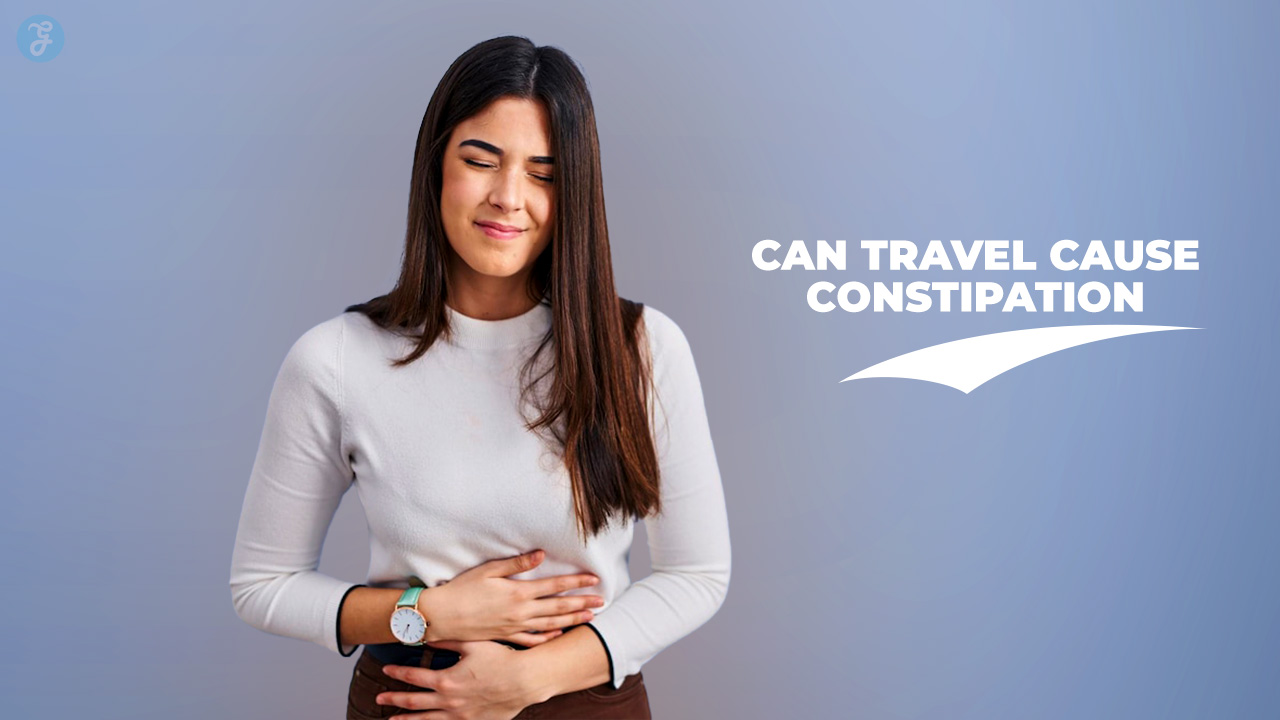Traveling is exciting, but it can also lead to constipation. Many people wonder if travel causes constipation. The answer is yes. Changes in daily habits while traveling contribute significantly to this issue.
Can Travel Cause Constipation? We will explore the reasons behind travel-related constipation and offer ways to prevent or address it.
When traveling, routines change. This impacts bowel movements. To manage or prevent travel constipation, consider these strategies:.
- Increase fiber intake by eating more high-fiber foods.
- Stay hydrated by drinking water regularly.
- Maintain physical activity to stimulate digestion.
- Consider stool softeners for temporary relief.
Understanding the causes helps in finding effective solutions for travel constipation.
Key Takeaways
- Changes in routine, diet, and less movement can lead to constipation during travel.
- To avoid this, drink plenty of water, eat foods high in fiber, and keep active.
- Stress can slow digestion. Use relaxation techniques to help your body.
- For quick relief from constipation, consider using probiotics, fiber supplements, or stool softeners.
- Stick to a regular eating and sleeping pattern to support your digestive system.
Causes of Travel-Related Constipation
Travel changes our normal routines, affecting our eating habits, physical activity, stress levels, and water intake. These changes can slow down digestion and cause constipation.
Changes in routine
Eating and sleeping at different times can upset your internal clock. This often happens during travel. Meal and sleep patterns change, especially on long flights or road trips where sitting for extended periods is common.
These changes can disrupt regular bowel movements.
Altering medication schedules complicates matters further. The digestive system needs a consistent routine to function properly. Changes in this routine can slow down the intestines and bowels, causing constipation.
Dehydration
Dehydration causes travel constipation. The body needs water to make stools soft for easy passing. On trips, people often drink less water due to being busy or lack of clean water.
Flying also dehydrates you because airplane air is dry. Drinking coffee and alcohol on trips increases dehydration.
To prevent this, drink 8 glasses of water a day. Use a reusable water bottle to keep drinking enough during your trip. Changes in diet can also affect digestion while traveling.
Dietary changes
Traveling changes eating habits. People eat more processed foods and less fiber. They also drink alcohol. These choices disrupt regular bowel movements. Eating fruits, vegetables, whole grains, and legumes can help.
These are high in fiber.
On trips, many opt for high-fat snacks instead of healthy meals. This switch can slow digestion. To keep the digestive system moving, it’s better to choose fiber-rich foods and avoid junk food.
Lack of physical activity
Sitting too much causes constipation, especially during long flights or rides. This inactivity slows the digestive system. Regular exercise prevents this problem by keeping the digestive system active.
However, exercising can be challenging while traveling.
Stretching and walking are effective exercises to combat travel constipation. Even short walks can activate muscles more than sitting, promoting better bowel movements. Therefore, it’s important to move around as much as possible during trips to prevent constipation from a sedentary lifestyle.
Stress and anxiety
Stress and little movement can slow your digestion. Feeling nervous shifts your body’s focus away from digesting food because the brain and gut connect closely. Stress may cause a “knot” in your stomach.
Feeling uneasy about using new bathrooms might make you delay going, which isn’t good for digestion. Managing stress with deep breathing, meditation, and yoga helps by calming both mind and body.
This supports smoother digestion and bowel movements.
Symptoms of Travel-Related Constipation
Pain during bowel movements and hard, dry stools are common issues. If you have bowel movements less than three times a week, it’s a sign of constipation. You may still feel bloated after going to the bathroom.
Seeing blood in your stool or experiencing abdominal pain means you should see a doctor. These symptoms often happen because of diet changes while traveling.
Tips to Prevent Travel Constipation

Stay active and eat healthily to prevent travel constipation.
– Carry a reusable water bottle to stay hydrated.
– Choose snacks like whole grain crackers and dried fruits for fiber while traveling.
Stay hydrated
Drink eight glasses of water daily to keep bowel movements regular and avoid constipation. A reusable water bottle makes staying hydrated easy, especially during long flights or car rides.
Include fruits like melons and oranges in your diet to stay hydrated because they contain a lot of water. Broths are another great option for maintaining digestive health while traveling.
Eat high-fiber foods
To avoid travel constipation, eat high-fiber foods. This includes fruits, vegetables, whole grains, and beans. These improve your digestive system’s function. For trips, pack snacks like apples, carrots, whole grain crackers, and dried fruits.
Fiber eases bowel movements. Include meals rich in fiber to maintain digestive health while traveling. High fiber intake prevents hard stools and promotes smooth bowel movements.
Maintain regular movement
Eating foods rich in dietary fiber is important. But, moving your body matters too. Sitting too much during travel, like on long flights, can slow digestion. Stretch or walk every hour if possible to aid digestion and health.
Being active also means using stairs instead of elevators at airports or hotels. Walking after meals helps prevent constipation by keeping the body regular and avoiding discomfort associated with constipation.
Stick to a schedule for eating and sleeping
Keeping a regular eating and sleeping schedule supports your digestive health. This routine helps make bowel movements more consistent, reducing constipation risk during travel. Adjusting to local meal times and sleep patterns quickly when traveling can prevent vacation constipation.
Stress impacts digestion and sleep quality negatively. Techniques like deep breathing, meditation or yoga can decrease stress levels, which improves gut health. A relaxed mind contributes to better digestive system function.
Remedies to Relieve Travel Constipation
If you’re feeling stuck, probiotics or fiber additions might help get things moving again. For tougher cases, a soft stool maker or a mild push from certain meds could offer relief.
Use probiotics or fiber supplements
Eating yogurt or kefir adds probiotics to your digestive system. Probiotics are good bacteria that keep your gut healthy and help prevent constipation. Fermented foods also offer these beneficial bacteria.
Taking Metamucil, a fiber supplement, can prevent constipation. Fiber supplements increase stool bulk, making it softer and easier to move through the colon.
Try stool softeners or laxatives if necessary
Probiotics and fiber help with constipation, but sometimes you might need more. Stool softeners and laxatives can assist. Metamucil and Milk of Magnesia bring water into your intestine to soften stools.
They make it easier for you to have a bowel movement. Ex-Lax and Dulcolax stimulate your intestines to move stools quicker. But, using them too often can cause problems.
Dulcolax offers fast relief from constipation. Its Soft Chews work in 30 minutes to 6 hours. Tablets take 6 to 12 hours, while suppositories provide quick results in 15 minutes to an hour.
Liquid gels need half a day up to three days for relief. In severe cases, doctors may recommend enemas or glycerin suppositories as final options.
Practice relaxation techniques
Stress often leads to worse constipation. Taking care of your gut health is essential. To manage stress, try deep breathing, quiet sitting, and yoga. These activities relax your mind and body, helping the digestive system function better.
Meditation also helps by focusing and calming you down, which can improve stomach health. You can do these practices anywhere, making them great for travelers aiming to prevent constipation issues.
FAQs
1. Can travel cause constipation?
Yes, travel can indeed lead to constipation. Changes in your diet routine, long flights, and a sedentary lifestyle during travel can disrupt your digestive system and circadian rhythm, leading to hard or dry stools.
2. How does my diet affect constipation when traveling?
Eating processed foods or high-fat foods like junk food while traveling can reduce fiber intake in your diet. This lack of dietary fiber may result in harder bowel movements causing discomfort due to constipation.
3. What are some signs of travel-related constipation?
Signs of this condition include less frequent bowel movements than usual, abdominal pain, and passing hard or dry stools. If you notice blood in the stool during a bowel movement, it could indicate more serious gastrointestinal issues such as rectum problems or colon disorders.
4. Are there ways to prevent getting constipated while on vacation?
Yes! Maintaining physical activity levels and sticking to a sleep routine helps keep your digestive health intact even on vacation. Consuming high-fiber foods like whole grains and dried fruits also aids digestion by softening stool consistency.
5. What are some remedies for dealing with travel-induced constipation?
There are several remedies available including osmotic laxatives like Milk of Magnesia or stimulant laxatives such as docusate sodium that gastroenterologists often recommend for chronic cases of constipation caused by factors like irritable bowel syndrome (IBS) or stressors from jet lag.
6. Should I carry any specific items with me when I’m traveling if I’m prone to experiencing ‘vacation’ constipation?
Carrying reusable water bottles ensures hydration which is key for healthy digestion along with fiber-rich snacks like dried fruits for quick relief from symptoms related to ‘vacation’constipation.





























